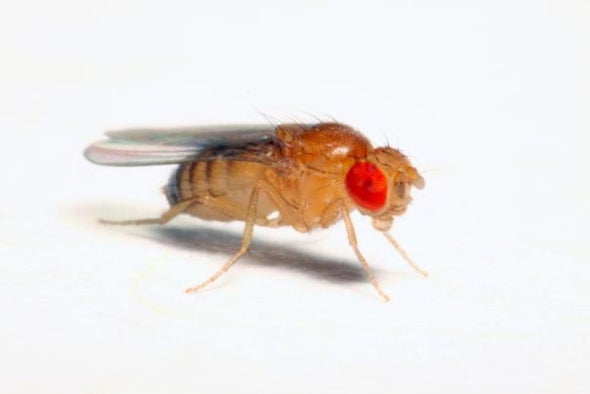This is Scientific American's 60-second Science, I'm Christopher Intagliata.
There's a scene in the Matrix where the character Cypher talks about the illusory experience of eating a fine meal:
CARLOS RIBEIRO: "And then he eats from the steak and says:"
(FILM CLIP: "I know this steak doesn't exist. I know that when I put it in my mouth, the Matrix is telling my brain that it is juicy and delicious.")
CARLOS RIBEIRO: "It tastes so good, I prefer this virtual reality to the cruelty of the world."
(FILM CLIP: "Ignorance is bliss.")
Recounting that scene is Carlos Ribeiro, a neuroscientist at the Champalimaud Foundation in Portugal. He has a special interest in that scene because he has essentially recreated that phenomenon—in fruit flies. "This is exactly what we're doing to the flies."
Here's how it works. He and his team raised genetically engineered flies with taste neurons that can be turned on and off with red and green light. That kind of process is known as optogenetics.

His team fed the flies bland food, which they understandably disliked. But then the researchers bathed the flies in light to turn on sweetness-perceiving neurons, and the flies gobbled up the food, which to them now tasted sweet. The team was also able to do the same with bitter neurons. The flies got bitter food, which they avoided—but the scientists then turned off the bitter neurons, and all of a sudden the flies changed their minds. "And so we have used this to create completely virtual taste realities for our flies."
The experimental details are in the journal eLife.
So, why do this? "We really want to understand how the brain uses sensory taste information to make feeding decisions—and also what goes wrong in obese people, for example, or when there are other diseases related to nutrition."
He also imagines we could someday use gene therapy techniques to plug senses back into the noses or tongues of people who've lost the ability to smell or taste. But for now, that is, like the Matrix, firmly the realm of science fiction.
(FILM CLIP: "I know kongfu." "Show me.")
Thanks for listening for Scientific American — 60-Second Science. I'm Christopher Intagliata.












